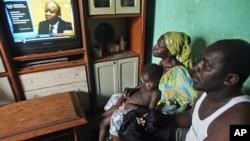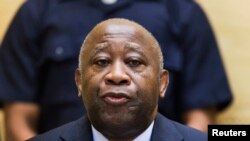ABIDJAN —
Ivory Coast officials say exhumations of mass graves dating back to the country’s 2010-11 post-election violence will begin next week. Both the government and rights workers say this process could produce a fuller picture of what went on during the six-month conflict and help in the fight against impunity.
The Justice Ministry announced this week that exhumations would begin on April 4 in the Abidjan district of Yopougon, which was a flashpoint during the post-election violence.
The conflict began after former president Laurent Gbagbo refused to leave office despite losing the November 2010 election to his challenger, current President Alassane Ouattara.
Although Gbagbo was arrested in April 2011, rights groups documented reprisal killings in Yopougon allegedly committed by the pro-Ouattara Republican Forces of Ivory Coast, or FRCI, that lasted into the following month.
Earlier this month, officials also began investigating more mass graves discovered outside the western town of Duekoue.
Unlike the graves in Yopougon, these graves are believed to have been dug after the post-election conflict - following a July 2012 raid on a camp for displaced persons.
Florent Geel, Africa director for the International Federation for Human Rights (FIDH), praised the beginning of the probes, but urged judicial officials to carry out a thorough investigation.
“It was the search and identification on the ground by the investigative judges of two mass graves identified by our witnesses," said Geel. "It was concretely the beginning of the inquiry by the investigative judge. It’s a first step of the judiciary machine in a way, and a concrete step to go forward and to have a real and clear investigation.”
FIDH documented interviews with witnesses who said that FRCI soldiers were involved in the raid on the camp. Officially, the attack claimed eight lives, though rights groups have said the death toll was likely much higher.
One mass grave found in the area was exhumed last October, yielding six bodies. But Geel said there are about a dozen others that have not been investigated.
The army commander in the region was reassigned after the attack on the camp, and officials have not formally responded to the allegations of military involvement.
Geel said a credible investigation would help to dispel the perception that Ouattara’s army is above the law.
“If justice is done on this case, it will show there is not orientated justice, and that the FRCI is not out of the scope of justice and that the FRCI can be judged in Côte d’Ivoire," he said. "That’s why this case is symbolic, important, and could show the good will of the political authorities in Abidjan.”
Soriba Kone, communications chief for the Justice Ministry, said he did not know how many mass graves officials would need to investigate, nor could he provide a timeline for when the effort might be completed.
The Justice Ministry announced this week that exhumations would begin on April 4 in the Abidjan district of Yopougon, which was a flashpoint during the post-election violence.
The conflict began after former president Laurent Gbagbo refused to leave office despite losing the November 2010 election to his challenger, current President Alassane Ouattara.
Although Gbagbo was arrested in April 2011, rights groups documented reprisal killings in Yopougon allegedly committed by the pro-Ouattara Republican Forces of Ivory Coast, or FRCI, that lasted into the following month.
Earlier this month, officials also began investigating more mass graves discovered outside the western town of Duekoue.
Unlike the graves in Yopougon, these graves are believed to have been dug after the post-election conflict - following a July 2012 raid on a camp for displaced persons.
Florent Geel, Africa director for the International Federation for Human Rights (FIDH), praised the beginning of the probes, but urged judicial officials to carry out a thorough investigation.
“It was the search and identification on the ground by the investigative judges of two mass graves identified by our witnesses," said Geel. "It was concretely the beginning of the inquiry by the investigative judge. It’s a first step of the judiciary machine in a way, and a concrete step to go forward and to have a real and clear investigation.”
FIDH documented interviews with witnesses who said that FRCI soldiers were involved in the raid on the camp. Officially, the attack claimed eight lives, though rights groups have said the death toll was likely much higher.
One mass grave found in the area was exhumed last October, yielding six bodies. But Geel said there are about a dozen others that have not been investigated.
The army commander in the region was reassigned after the attack on the camp, and officials have not formally responded to the allegations of military involvement.
Geel said a credible investigation would help to dispel the perception that Ouattara’s army is above the law.
“If justice is done on this case, it will show there is not orientated justice, and that the FRCI is not out of the scope of justice and that the FRCI can be judged in Côte d’Ivoire," he said. "That’s why this case is symbolic, important, and could show the good will of the political authorities in Abidjan.”
Soriba Kone, communications chief for the Justice Ministry, said he did not know how many mass graves officials would need to investigate, nor could he provide a timeline for when the effort might be completed.





